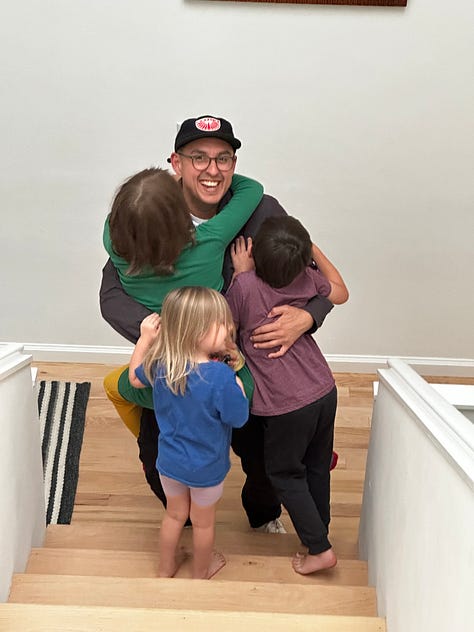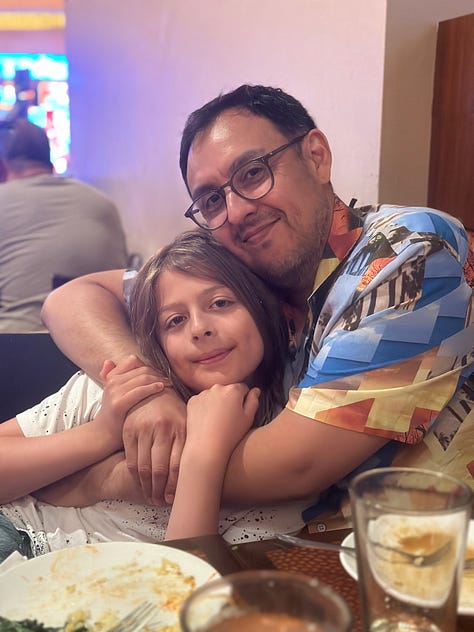Dads Benefit from Gender Equity, Too
Happy Father's Day ❤️
Happy almost Father’s Day to the Dads out there!
I know that the majority of Gen Xandwich readers are women, but there are many dads in this community as well. In fact, many of you I know are involved dads that talk about your emotions and struggles, and take on day-to-day care and mental load of your kids’ lives. Some of you are also trying to balance care for parents with dementia. I see you and I appreciate you, and I love that several of you have chosen to reach out and share your stories with me.
I write a lot about the gender inequities in care, which most visibly and materially play out for mothers. But dads and male caregivers face challenges too. Many of these are due to the lack of structural and community support that virtually all caregivers face. Others are specific to men, and are often byproducts of the same gender inequity that can hold female caregivers back.
The idea that dads can’t or won’t do “mom” things is an example that is constantly reinforced in our every day lives, and this makes going against these norms even more challenging. Almost every parent will tell you that many daycares, schools and camps always call mom first, and party and activity invites are sent to moms. In families where dad is the default or primary parent, or whose task it is to manage school schedules, calling mom first even when instructed otherwise is not uncommon, but can make life harder for everyone the family.1
Moms are held to higher standards by society - and will bear the consequences of those standards not being met. There are countless anecdotes about the different responses that dads and moms receive at the playground. Dad wearing a baby is “such an amazing dad!” while mom wearing a baby is more likely to be picked apart for looking at her phone or because her baby isn’t wearing socks.
Aside from perhaps the extra pat on the back, dads don’t ultimately benefit from lowered expectations any more than women do.
This dynamic is what incentivizes moms to gate keep certain responsibilities, wanting “control” over parenting, because they know they will be the ones facing judgement if it’s subpar. Frankly, treating dads like they are only capable of babysitting but not parenting is pretty patronizing to dads, too, and sends them the message that they aren’t naturally capable caregivers.
Men also face mixed messages about what it means to be a “good man” and how to be an equitable father and partner while still feeling the pressure to be a breadwinner, and having their identity tied to income and stoicism. These messages often reinforce toxic ideas about masculinity that not only discourage men from being involved caregivers, but in turn are linked to increased loneliness, violence and suicide rates.
This constant social and structural feedback makes it feel like an uphill battle to change gender norms in our own families. But we should, for greater equity, of course, but also because the act of caregiving itself is correlated with better quality of life for men. Gary Barker, founder and CEO of Equimundo shared that:
“Our research from around the world finds that men who report being more involved in the daily care of their children and emotionally closer to their children are happier, they are more motivated at work and they tend to take greater care of themselves.”
I tuned in to the Future of Fatherhood Summit last week, organized by Moms First and Equimundo. It was uplifting just to see men and women together discussing parenting, in times when it can be hard to find positivity out there. And particularly at a time when feminist backlash is so rampant in public life.
Reshma Saujani, Moms First founder & CEO, opened by addressing the question of why is Moms’ First would organize a dad summit. Her answer summed it up so well:
“The crisis of moms and the crisis of masculinity are not separate problems. They are symptoms of the same broken system. Two sides of the same coin.”
We aren’t going to move any closer toward gender and care equity if half of the population isn’t on board or convinced of the benefits to everyone. The idea that gender equity is a zero sum game is a false narrative that is sold (successfully in this current moment) to keep systems of patriarchy in place - to everyone’s detriment.
The conference panelists included Jonathan Haidt, author of “The Anxious Generation,” who is known for his arguments about the dangers of letting our children roam free on the internet instead of in our neighborhoods. There are many angles to his argument, but specific to dads he talked about the biological and developmental need for children to experience thrills, risk-taking, and rough-and-tumble play. This role, he points out, can be one that often suits dads. Haidt also talked about the increasing lack of “social trust” in our societies - the overestimation of danger out in our communities - which increases the burden on all parents.
Also participating was Rep. Jimmy Gomez of CA’s 34th district, who founded the Congressional Dads Caucus and famously wore his baby while casting the House Speaker vote for Hakeem Jeffries in 2023. He talked about California’s paid leave policy, which initially was exercised primarily by women, but they are seeing a steady increase in the proportion of men taking family leave - now up to 40%. Just another example of how supportive care policy benefits everyone.
There was discussion about effective strategies to build community among dads, while also rejecting the narratives about what is a “mom’s job” or who is naturally more capable of certain tasks vs. others. I’ve heard many dads express that they struggle to find content and community that feels supportive and inclusive to their caregiver identity. There just isn’t the equivalent to the mommy-blogosphere for dads, and the mommy blogs don’t feel inviting to, or resonate with men.
Father’s Day cards and gift lists are an annual reminder of how far we have to go to change social norms and ideas. Most cards still feature outdated tropes about golfing and beer-drinking, or other “masculine” hobbies; or they make fun of rather than celebrate dads’ contribution to family life. If you can’t find any cliche-breaking options out there, you can download some here.
There are some emerging examples of dad content that works against gender normative thinking and weaponized incompetence. I recently came across Dad Braids - run by a dad who decided he needed to learn how to braid his daughters’ hair, and now teaches other parents how to easily braid and style long hair. He is relatable and normalizes dads braiding hair without self-deprecation or being overly self-congratulatory.
A friend just shared the critique that most followers of Dad Braids and similar dad content are actually women. I still think that having examples out there of men breaking with gender norms is incredibly important. It’s a bit of a chicken and egg problem: if men aren’t even looking for content about hair braiding, they aren’t going to suddenly search out and follow Dad Braids; but they need examples like him to be nudged to try typically “mom” things and search for the content in the first place.
I’d love to hear from dads out there: do you have favorite resources for content and support, specific to you as a dad? What other challenges do you face as male caregivers?
I want to acknowledge that in the same way that mother’s day can be tough, Father’s Day can be hard for many as well. I miss my dad every day, but it stings a little more on Father’s Day. Sending love to others in the same boat.
Lastly, I couldn’t end with out giving a shout out to Alex, our family’s Awesome Dad who talks to our kids about emotions and art, gives lots of hugs and kisses, is our incredible on-site family photographer, works hard, packs lunches, picks up kids, wrestles and plays endless games of Uno. We love you and appreciate you so much!





With care,
Anna
The Atlantic article about the Default Parent Problem lays this out really well.





Hear, hear!